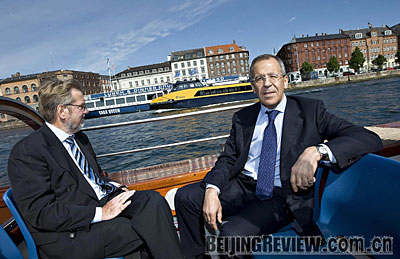|
In late August, the Canadian military also began Arctic training exercises for emergencies arising from increased commercial, research and recreational traffic. "With climate change and the opening of the Northwest Passage, we're seeing increases in all those areas," said Brigadier-General David Millar, Canadian Commander of Joint Task Force North. According to the Canadian Press, the exercise was "designed to boost Canada's Arctic sovereignty and increase the military's ability to respond to emergencies."

RUSSIAN STANCE: Danish Foreign Minister Per Stig Moller (left) and his Russian counterpart Sergey Lavrov enjoy a canal tour in Copenhagen on May 27. At a press conference later that day, Lavrov announced that Russia had no territorial claim to the Arctic (XINHUA/AFP)
In August 2007, Russia planted a flag on the seabed under the North Pole. On September 17 this year, Russian President Dmitry Medvedev ordered his officials to draft a law marking Russia's southern Arctic zone. "It is our duty to our direct descendants," a Reuters report quoted him as saying. "We have to ensure the long-term national interests of Russia in the Arctic." In the meantime, Russia is conducting military training in the Arctic region as well.
As early as 60 years ago, the United States began sending expedition teams to the Arctic region. The United States, Russia, Britain and France have all had nuclear submarines in Arctic waters.
Other countries have been less bold, but they still hope to share in the Arctic spoils. Norway is halfway into a two-year Arctic drilling plan, and this summer Iceland got in on the action as well. Chen Xulong, an international studies expert at the China Institute of International Studies (CIIS), predicts that more countries will join in the competition.
Coming challenges
Chen concluded that none of the countries involved would let go. "All of them will try their best to get the biggest profit instead of giving up to their competitors," he told Beijing Review. As a result, he said, these countries must adopt every method they can, like exploiting loopholes in international law, claiming sovereignty, sending scientific expedition teams and launching military exercises.
Chen said that the international community will not stand by and allow the situation to worsen, but will make an effort to mediate disputes and protect the environment so as to minimize the damage that might result from international competition. However, he stressed that Arctic and Antarctic issues are politically and legally complex, posing a serious threat to order in the polar areas.
Chen pointed out that since no country's continental shelf has been proven to extend into the Arctic, it remains international territory. On August 22, Hong Kong-based Ta Kung Pao newspaper published an article saying that the Arctic does not belong to any country but is the shared property of people throughout the world. Every country has an equal right to exploit the Arctic, the article said, and countries competing for sovereignty are infringing on that right.
"Currently, the competition remains in the scientific research field, targeted at finding scientific evidence to prove their legal sovereignty over the area," Chen said. "However, military action is most effective in establishing sovereignty, so sooner or later these countries will take military action in the Arctic area. The fight is just beginning."
The competition could have major implications for the United Nations Conference on the Law of the Sea (UNCLOS), a 1982 international agreement laying out rights and responsibilities. The U.S. Senate never ratified the treaty, but may reconsider since it would grant the United States new legal rights. Chen said the competition could lead to UNCLOS revisions or entirely new Arctic laws.
The competition will also influence the global chess game among superpowers. Chen took Russia's flag-planting as an example. In recent years, the U.S.-led Western world has kept Russia on the defensive, but now Russia is using its energy resources and military strength as leverage. "The flag-planting was Russia's counter plan," Chen said. "The competition hides invisible dangers. It can reshape the international political and military order in the end."
Chen said the competition might drive the countries involved to launch new policies on the Arctic. The European Union is considering issuing new Arctic policy. Common interests could also forge new coalitions. For example, countries around the Arctic could join forces to exploit its resources while excluding others.
International competition benefits the Arctic in at least one respect: The region's strategic and economic value has spurred extensive scientific research about the polar area. Norway, Britain, France, Germany, Russia and the United States all have observation stations.
Chen said the competition could also lead to a new international mechanism for dealing with Arctic disputes through peaceful dialogue and diplomacy. "But the precondition is these countries must have the common will to do so," he said. "They need to compromise with each other."
Chen also noted that Antarctic exploration could be different. "Human beings have missed their opportunity to share the Arctic, but there is still a chance for Antarctica, as the non-military and environmental protection principles have been set for the Antarctic area," he said.
Yin Chengde, another CIIS expert, suggested four principles that might calm the current situation: globalization, peace, fairness and credibility. History shows that confrontation and conflict do not work, Yin said. Only through international cooperation can problems be resolved peacefully. That will ensure a bright and peaceful future not only for the Arctic, but also for the world below it. | 